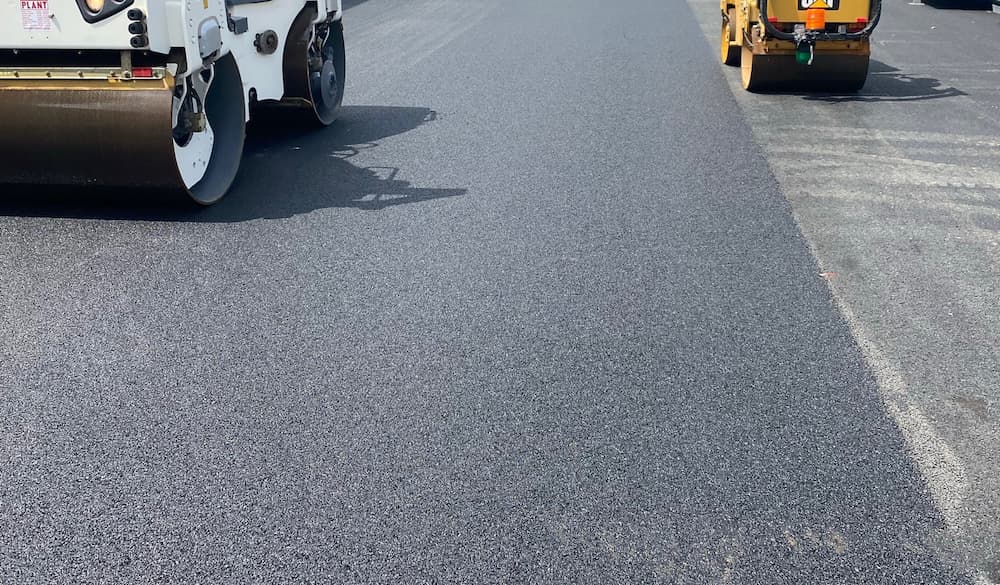Why Tarmac is Still a Favourite for UK Roads
October 28, 2024 Road Repairs, Road Resurfacing, Road Surfacing 3 min read

Tarmac, a staple of British roads since the early 20th century, continues to be the material of choice for road construction across the UK. Its historic roots date back to the development of tar-bound macadam by Scottish engineer John Loudon McAdam in the 1820s, later improved by adding tar to bind the surface. Today, tarmac’s blend of durability, affordability, and ease of repair ensures it remains indispensable in road building.
The Composition and Properties of Tarmac
Materials Used in Tarmac
Tarmac, short for tarmacadam, comprises two primary components: bitumen and aggregates. Bitumen, a sticky, black viscous liquid, is a by-product of petroleum distillation. It acts as a binding agent, gluing the aggregates—rocks, gravel, or sand—into a solid mass. This concoction results in a smooth, durable surface ideal for roadways.
Durability and Weather Resistance
The UK climate, notorious for its unpredictability, demands a road surface that can withstand fluctuating temperatures, heavy rain, and occasional bouts of snow. Tarmac excels here due to its flexibility. Unlike concrete, which can crack under temperature extremes, tarmac is resilient, adapting to expansion and contraction without significant damage. This resistance extends its lifespan even in challenging conditions.

Tarmac Being Laid
Benefits of Tarmac for Road Construction
Cost-Effectiveness
One of tarmac’s significant advantages is its cost. Compared to concrete and other surfaces, the initial costs of tarmac are lower. While some might argue for alternatives like concrete for their longevity, the relative affordability and ease of tarmac installation often outweigh potential long-term savings from concrete.
Ease of Maintenance and Repair
Maintenance is straightforward with tarmac. Quick and efficient repairs ensure minimal disruption to traffic. Potholes, a bane for motorists, are easily patched, often within a day, restoring the road surface to its original condition. This swift repair capability reduces long-term wear and tear, saving councils money in the long run.
Noise Reduction and Comfort
Tarmac excels in noise reduction. Known for its smooth, quiet surface, it reduces tyre friction noise, providing a more pleasant driving experience. In residential areas, quieter roads mean happier residents, making tarmac an even more attractive option for urban settings.
Environmental Considerations
Recyclability of Tarmac
Amid growing concerns about sustainability, tarmac’s recyclability is a compelling selling point. Old tarmac can be milled and reused in new projects, significantly reducing waste and conserving natural resources. Recycling tarmac also curtails the need for new bitumen production, decreasing the overall carbon footprint.
Innovations in Tarmac Technology
Recent advancements have made tarmac even more eco-friendly. Innovations like warm-mix tarmac, which uses lower production temperatures, reduce energy consumption and emissions. Researchers are also exploring self-healing tarmac, incorporating materials that respond to cracks by automatically repairing them, extending road life spans and reducing maintenance demands.
Get in Touch
In summary, tarmac remains a preferred choice for UK roads due to its composition, durability, and cost-effectiveness. Its environmental benefits and advancements in technology ensure it continues to meet the needs of modern infrastructure. Whether constructing new highways or maintaining existing streets, tarmac offers a reliable, sustainable solution. Get in touch with us to learn more about how tarmac can meet your road construction needs and contribute to smoother, safer journeys.
Get your free surfacing quote
Let our team of experts handle your surfacing — get a free quote today.